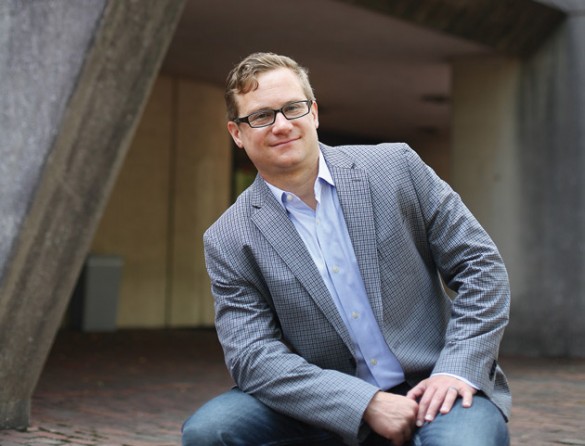
Growing up close to nature in the small timber-and-fishing community of Gold Beach, Ore.—population 2,000—gave John Wilson an early interest in biology and biologically inspired design.
That, combined with an aptitude for math and physics, drew him into the field of bioengineering. When Wilson sets up his lab at Vanderbilt in January, the new assistant professor of chemical and biomolecular engineering will be developing synthetic vaccines.
Since Edward Jenner pioneered the first vaccine against smallpox in 1796, the development of vaccines—biological preparations that improve an individual’s immunity to a specific disease—has been one of the greatest public health success stories, breaking the death grip of dozens of infectious diseases. However, scientists have not yet succeeded in developing vaccines for many significant diseases, such as malaria, HIV and even cancer.
So far most vaccines have been created using inactivated or attenuated compounds from microorganisms. One of the newest approaches is the development of synthetic vaccines, which are composed mainly or entirely of synthetic compounds.
“[rquote]With synthetic vaccines, we have the maximum amount of control, so we should be able to tailor the response of the immune system to the maximum extent possible,” Wilson said.[/rquote] For this reason, he argues that it should be possible to create synthetic vaccines that will be more effective against diseases such as HIV and malaria, which have resisted all previous efforts.
Wilson pursued an undergraduate degree in bioengineering at Oregon State University. A fellowship from the Whitaker Foundation allowed him to pursue graduate studies at Georgia Institute of Technology, where he joined the lab of world-class surgeon and chemical engineer Elliot Chaikof. There he helped develop better materials for encapsulating insulin-producing islet cells for implantation into the liver as a treatment for diabetes.
This experience earned Wilson a post-doctoral fellowship at the University of Washington with Patrick Stayton, a widely recognized expert on intracellular drug delivery. Stayton’s success in commercializing his research got Wilson seriously interested in following suit. In Stayton’s lab, he developed a new class of synthetic vaccine that can carry not only the antigen—the piece of protein from the bacteria or virus that tells the immune system what to attack—but also an adjuvant—a different compound that triggers the immune response. Normally, these are administered separately.
Because synthetic vaccines are designed and built from scratch, they have the ability to unlock the immune system’s full potential, Wilson said. “I’ve realized that the immune system is the key to so many diseases, and that will be the guiding principle of my lab,”
he said.
View the complete list of new university faculty for 2013-14.
View the complete list of new medical faculty for 2013.